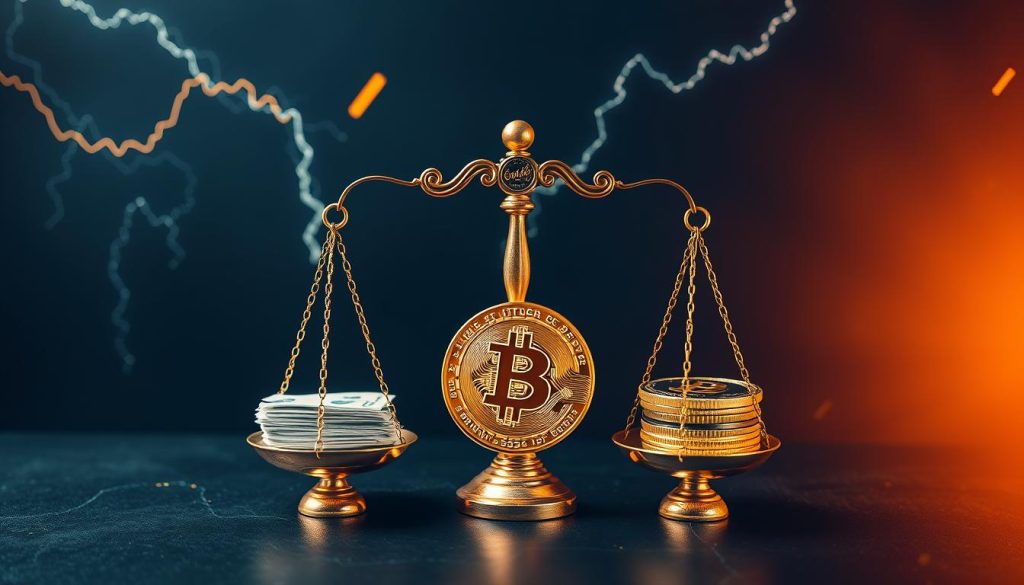The cryptocurrency market has seen big gains in 2023. Bitcoin’s value has almost doubled, and Ethereum has introduced over 330,000 new tokens in just two months1. This growth has caught the eye of many investors eager to dive into digital assets. Yet, the market comes with risks like hacking, scams, and no FDIC insurance.
In this guide, we’ll explore the legal and regulatory world of crypto. We’ll talk about how to protect your investments and weigh the pros and cons of Bitcoin. We’ll also share when it might be time to sell your digital assets. This article aims to help both new and experienced investors make smart choices in the ever-changing crypto market.
Key Takeaways
- Bitcoin’s value increased by almost 70% in 2023, making it an attractive investment opportunity.
- Ethereum created over 330,000 new tokens in just April and May, indicating the rapid growth of the cryptocurrency ecosystem.
- Regulatory uncertainties and potential government crackdowns are potential drawbacks of investing in Bitcoin.
- Factors like the team behind the cryptocurrency, its real-world utility, and market demand are crucial when evaluating investment decisions.
- Offshore crypto exchanges may be risky due to non-compliance with U.S. regulations, making it important to consider the legality and security of your investment platform.
Understanding the Legal and Regulatory Landscape
The world of cryptocurrency is growing fast. It’s key for investors and businesses to understand the legal and regulatory rules. In the U.S., several government agencies watch over crypto regulations and cryptocurrency rules.
Existing Crypto Regulations
The U.S. crypto regulations are mainly managed by two agencies: the Securities and Exchange Commission (SEC) and the Commodity Futures Trading Commission (CFTC). The SEC looks after cryptocurrencies seen as securities, like ICOs and utility tokens2. The CFTC handles cryptocurrencies seen as commodities, such as Bitcoin and Litecoin2.
It’s important to get legal advice to follow tax, accounting, banking rules, and contracts2. Also, knowing the legal risks of cryptocurrency investment is key. Cryptocurrencies can be targets for scams because they are decentralized2.
Following anti-money laundering (AML) and know-your-customer (KYC) rules is crucial. This helps prevent fraud and criminal activities in crypto exchange transactions. It also helps avoid big penalties2.
Offshore Exchanges and Legality
Offshore crypto exchanges might seem attractive, but they carry big risks. These exchanges might follow their own rules, not U.S. ones. It’s safer to use exchanges approved by the U.S. government2.
In 2024, the SEC made a big move by approving 11 applications for U.S.-listed ETFs for Bitcoin and Ether3. Big names like BlackRock and Fidelity are involved in these ETFs. This has helped the market’s regulatory landscape3.
The SEC might approve other cryptocurrencies like Toncoin (TON) soon. This could open up more investment options for crypto investors3.
But, the FTX collapse shows how important it is to protect investors. The need for international rules for the metaverse and digital assets is also growing. The IMF and World Bank Group are key in setting standards and working together3.
“The regulatory landscape for crypto and digital assets is fragmented and evolving quickly, with multiple regulators at federal and/or state level potentially having jurisdiction over transactions. Efforts to define an appropriate regulatory regime may require legislative changes.”4
Safeguarding Your Cryptocurrency Investments
The crypto market is growing fast, with Bitcoin and Ethereum seeing huge gains in 20235. It’s key to keep your digital assets safe. There are many ways to protect your crypto investments.
First, turn on two-factor authentication (2FA) for all your crypto wallets and exchange accounts6. This extra step helps stop unauthorized access and transactions. It greatly lowers the chance of your funds being stolen. Also, think about using a hardware wallet. It keeps your private keys offline, making it tough for hackers to get to your digital assets7.
Choose a trusted and secure crypto exchange like Kraken, Coinbase, or Crypto.com. These platforms have strong security, including cold storage for most of their crypto5. They also have security experts to find and fix any problems5. Don’t use public Wi-Fi when accessing your crypto accounts, as it can be risky.
Regulations in crypto are getting better, with laws like the Identity Verification Law and the Infrastructure Investment and Jobs Act5. These laws aim to make digital asset transactions safer and more transparent. But, some offshore exchanges might be risky, as they could block U.S. users to avoid fines5.
To keep your crypto investments safe, be proactive and careful. Use 2FA, hardware wallets, and pick reliable exchanges. This way, you can lower the risk of losing your digital assets6. Remember, the easier a storage method is, the less secure it usually is. So, finding a balance between ease and safety is important7.
| Security Feature | Description | Recommended for |
|---|---|---|
| Two-Factor Authentication (2FA) | An additional layer of security that requires a second form of authentication, such as a code sent to your phone, to access your account. | All crypto wallets and exchange accounts |
| Hardware Wallet | A physical device that stores your private keys offline, making it much harder for hackers to access your digital assets. | Long-term cryptocurrency storage and investment |
| Reputable Crypto Exchanges | Exchanges like Kraken, Coinbase, and Crypto.com that have robust security measures, including cold storage and security experts. | Buying, selling, and trading cryptocurrencies |
| Offline Storage (Cold Storage) | Storing your private keys on a device or medium that is not connected to the internet, reducing the risk of online hacks. | Long-term cryptocurrency storage and investment |
“The more convenient a storage method is, the less secure it tends to be, underlining the importance of controlling keys personally for enhanced security.”7
By using these security steps and keeping up with new rules, you can protect your crypto investments. This ensures the safety of your digital assets for the long term.
investing in bitcoin: Evaluating the Pros and Cons
Investing in Bitcoin might seem appealing because of its high return potential. It uses secure, decentralized blockchain technology and works 24/7. This has drawn many investors8. But, its price can change a lot, making it hard to predict. It also has a steep learning curve and security issues9.
To make a smart choice, knowing the basics is key. This includes the team behind it, its uses, and the demand for its tech8. Online platforms like Fidelity have made entry easier. Still, investors should research the market, stay updated on regulations, and diversify to manage Bitcoin’s ups and downs.
Pros of Investing in Bitcoin
- High Return Potential: Bitcoin’s value grew by 500% in 2020, showing its growth potential9.
- Secure Blockchain Technology: Its decentralized, secure blockchain technology is strong for transactions and asset ownership8.
- 24/7 Operation: Unlike traditional markets, the cryptocurrency market is open all the time. This gives investors more flexibility and access8.
Cons of Investing in Bitcoin
- Volatility: Bitcoin’s price has seen huge swings. It hit nearly $20,000 in 2017 but fell to under $4,000 the next year9.
- Security Risks: The market is vulnerable to hacks and scams. Investors must focus on security and keep up with news8.
- Energy Consumption: Mining Bitcoin uses a lot of energy, similar to a small country. This raises environmental concerns9.
- Limited Acceptance: Bitcoin is not widely accepted as payment. This limits its use compared to traditional currencies9.
Investing in Bitcoin needs careful thought about both the benefits and risks. Knowing the pros and cons helps investors make better choices and handle the cryptocurrency market well89.
“Cryptocurrencies like Bitcoin are still a relatively new and volatile asset class, and investors should thoroughly research and understand the risks before investing.” – Financial Expert
When to Consider Selling Your Cryptocurrency
Knowing when to sell your cryptocurrency is key for smart investors. Bitcoin and Ethereum have grown a lot over time10. But, the market can change fast, so you need to watch it closely and make smart choices11. Here are some signs it might be time to sell:
Lack of Development Progress
If a project you’ve invested in isn’t getting better, it’s time to think again12. No progress means the team might not be serious or have a clear plan. This makes it a less good investment for the future.
Reallocating Funds and Cutting Losses
It’s smart to sell your investment if it hasn’t done well. If it’s doubled or tripled in value, selling some to invest elsewhere is wise11. If it keeps losing value, cutting your losses is the best move.
Negative News and Market Sentiment
News and media can really affect the crypto market12. Bad news, legal issues, or a shrinking community are signs to sell11.
Selling your crypto should be done carefully and with a plan11. Keep an eye on the market, know your investments, and use good investment strategies. This way, you can decide when to sell and get the most from your investments12.
| Cryptocurrency | Use Case | Market Cap |
|---|---|---|
| Bitcoin (BTC) | Digital Currency | $1 Trillion |
| Ethereum (ETH) | Smart Contracts and Web3 | $500 Billion |
| XRP (XRP) | Banking and Financial Services | $50 Billion |
“Cryptocurrency investing can be volatile, and traditional investment rules for stocks do not always apply.”
Deciding when to sell crypto is a personal choice12. It should be based on your goals, how much risk you can take, and understanding the market and your investments11. By staying informed and using good investment strategies, you can make smart choices for your financial future111210.
Conclusion
Investing in cryptocurrencies in 2023 is complex. You need to know the legal rules, risks, and chances13. In the U.S., courts say cryptocurrencies are securities for big buyers but not for small ones13. Countries like El Salvador have made Bitcoin legal money13. Japan and Europe have their own rules for digital assets13.
Managing your crypto portfolio in 2023 is all about balance14. Bitcoin’s price swings show the importance of weighing the good and bad of investing14. New players, like Fidelity’s Crypto platform14, bring more choices for investors.
To succeed in 2023, stay updated on new rules, use trusted platforms, and balance risks and rewards14. Think carefully about your strategy and watch the market closely. This way, you can make the most of crypto’s opportunities while facing its challenges.
FAQ
What are the key cryptocurrency regulations in the U.S.?
Are offshore crypto exchanges safe to use?
How can I protect my cryptocurrency investments?
What are the pros and cons of investing in Bitcoin?
How do I know when to sell my cryptocurrency?
Source Links
- investing in bitcoin? The Bold Investor’s Guide to Navigating Cryptocurrency in 2023
- Cryptocurrency: Navigating the Legal Landscape
- Navigating the U.S. Regulatory Landscape for Blockchain and Cryptocurrency Part III Potential future U.S. regulations for blockchain
- Crypto and digital assets: Regulatory challenges
- 2024 Guide: What You Need to Know to Invest in Crypto Safely
- Cryptocurrency Safekeeping: What are the Best Practices – Equity Trust
- Protect Your Bitcoins Against Theft and Hacks
- Cryptocurrency Basics: Pros, Cons and How It Works – NerdWallet
- The Pros and Cons of Investing in Bitcoin
- Should I Sell My Bitcoin?: Pros and Cons | CoinLedger
- When to Sell Crypto: Everything You Need to Know | The Motley Fool
- When to Sell Crypto
- Cryptocurrency Explained With Pros and Cons for Investment
- Is Bitcoin a Good Investment? – NerdWallet


